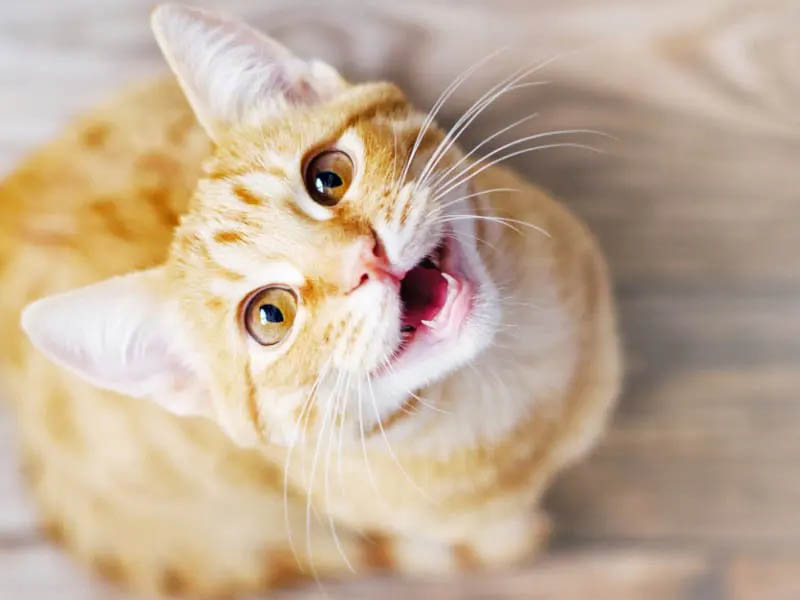
Why Is My Cat Meowing So Much: 9 Common Reasons for Excessive Meowing
This post may include affiliate links. Please read my disclosure policy.
A while back, my cat, Olivia, started meowing excessively for no apparent reason. When she would meow, it sounded like she was in a bit of distress. But when I approached her, she acted normal and friendly.
If your cat is meowing excessively, this article will help you decode your cat’s meow and figure out what they’re really trying to tell you.
What Is Excessive Vocalization?
Excessive meowing in your cats refers to a behavior where a cat meows more frequently or loudly than what is considered typical for them. Excessive cat meowing can be characterized by persistent and intense meowing throughout the day or night, often accompanied by other signs like restlessness, pacing, or attention-seeking behavior.
Why Your Cat Won’t Stop Meowing
I consulted The Catvocate, Veterinarian Dr. Liz Bales, who is an expert on cat behavior. And what she told me was gold!
She told me that there isn’t one single reason for a cat’s excessive vocalization. In fact, there could be many reasons. The good news is, once you understand your cat, you figure out just what they need and why they’re meowing so much.
There are nine common reasons why cats meow excessively. Most are benign, but some will need to be addressed by a professional.
Your cat may meow a lot because they:
- Are greeting you
- Feel lonely
- Want to mate
- Are hungry or thirsty
- Feeling sick
- Want attention
- Have impaired cognition (common in senior cats)
- Are bored
- Are stressed or anxious (e.g., they have no direct access to a clean litter box)
In order to figure out which reason is behind your cat’s meow, we need to understand their behavior a bit better. Then, we’ll dive into some dos and don’ts about reacting to your cat’s cries.
1. They’re Greeting You
Your cat might just be trying to say “hello.”
After you’ve been away, it’s not unusual for your kitty to run and greet you at the front door and give you a sweet meow. She may also be inclined to greet new visitors.
This greeting may be lengthy and is likely just your cat’s way of telling you how much they missed you.
Watch my full interview with Dr. Bales below.
2. Your Cat is Lonely
Despite cats’ reputation for being loners, they actually do get lonely.
In a recent survey, nearly one out of ten cat parents reported their cats showing signs of separation anxiety when their owners leave the house.
And if you’re home but not spending time with your cat, meowing a lot may be their way of expressing their loneliness.
Try spending some time with your cat, grooming them, cuddling, or talking to them for 20 minutes two times a day. You may notice your cat becomes less vocal after doing this regularly.
3. They Want to Mate
Unspayed or unneutered male and female cats that meow excessively at night may be their way of attracting a mate.
Unspayed female cats make a very specific yowling meow when they are in heat. A male cat can also hear these specific yowls and even smell a female in heat, resulting in excessive meowing. Spaying or neutering them will end this behavior.
If this is the case, your cat’s behavior is perfectly normal. You’ll likely notice it stops once your female or male cat is spayed or neutered.
There are many health benefits associated with “fixing” your feline, not to mention that your kitty won’t be contributing to pet overpopulation!
4. Their Needs Aren’t Being Met
Your cat’s excessive meowing may mean you need to check their food and water supply, similar to how kittens meow when they’re hungry, thirsty, or cold. Is there food and water available, and if so, are they eating and drinking it?
If your cat is rubbing against your leg when you walk by their dish, chances are, they want you to fill it up.
However, if your cat isn’t touching their food and water, there may be a couple of reasons why.
Your cat may simply not like the food, or they may have a medical issue that’s causing them to lose their appetite. If this is the case, of course it’s best to visit your veterinarian to rule out any health issues. Cats also frequently develop a skin allergy to some plastics, so use a ceramic or glass feeding bowl.
If they’re not drinking their water, they may be thirsty, but perhaps experiencing “whisker fatigue.”
Since cats use their whiskers to sense much of their world, they’re very sensitive. Repeated contact with the edge of their bowl may cause irritation to their whiskers, causing them not to eat or drink, even when they’re thirsty or hungry.
If this is the case, try using a fountain, like the one shown later in this article.
Also ensure your feline friend’s litter box is kept relatively clean. No one likes a clogged-up or full toilet, so neither will your cat. Check if their litter box is still accessible to them as well.
On the topic of litter boxes, ensure you have at least one litter box per feline family member, plus one extra. For finicky cats, make sure it is large enough for them to get fully inside and be able to turn around. Having multiple locations for boxes is also important if you have more than one kitty.
5. They’re Sick
She could be meowing because something is truly wrong. As our cats age, they often develop health issues, so she may have pain or she could be confused.
Dr. Liz Bales says hyperthyroidism can also be a culprit. She says,
“Cats who become hyperthyroid meow a lot, particularly overnight. Hyperthyroidism is a disease most commonly seen in cats over 8 years old.”
If you can’t figure out why your cat is meowing, your cat seems ill, or her meowing is excessive, it’s important to have a talk with your veterinarian to rule out any underlying conditions.
6. They Want Attention
If your cat comes up to you, rubs against your leg, and meows or purrs, you can bet that she is just seeking some attention.
This is a bit different from loneliness. They may crave attention even if you’ve been around to give it to them. They might simply want to share experiences with you, like looking out the window or playing.
Cats love interactions with their family, so it’s important that we show them how much we care for them by giving them that attention.
7. Their Cognition is Impaired
As felines age, they may develop cognitive issues, just like humans often do.
Their excessive meows may be out of boredom, confusion, anxiety, or habit.
If your senior cat is meowing excessively, it’s best to visit your veterinarian to rule out anything serious as well as to learn how to make them comfortable in their precious senior years.
8. They’re Bored
As any parent of a toddler knows, boredom can lead to some less-than-desirable behavior. It’s really no different with cats!
Especially if your cat is the only feline in the home (like my Olivia was for some time), she may become restless and look for a way to be entertained.
Just because cats are rather independent creatures doesn’t mean they don’t need mental and physical stimulation in their environment.
Feline enrichment is a hot topic these days because so many house cats are overweight or obese (about 50%!) since they don’t get enough exercise or opportunities to use their natural instincts.
Keep reading below for some advice and product solutions on enriching your cat’s environment.
9. They’re Stressed or Anxious
Excessive vocalization is one symptom of cat anxiety.
Meeting new people, losing family members (fur or human), or loud noises can all cause your cat to become stressed.
Change in their environment, even as subtle as closing once-opened doors, can cause your cat stress.
When stress is prolonged, your cat may develop anxiety. This anxiety can make your cat meow louder or more frequently than normal.
See this resource page for more help on dealing with pet anxiety.
What Does My Cat Mean When They Speak?
Pet parents are often cognizant of their kitty’s various meows, but when they start making excessively loud or even soft constant meows that’s uncharacteristic of them, along with any unnatural body language or other cues, it’s helpful to know what their meowing may mean.
| Meow Type | Meaning |
| Short meow | General greeting or acknowledgment. |
| Prolonged meow | Request for attention or interaction. |
| Multiple meows | Excitement or anticipation. |
| Chirping meow | Expression of curiosity or interest in something. |
| Trills | Friendly greeting, often used between cats or humans. |
| Loud, low-pitched meows | Discomfort, pain, or distress signal. |
| High-pitched meows | Frustration, annoyance, or impatience. |
| Rumbling meows | Contentment, often heard during kneading or cuddling. |
| Yowls | Indication of stress, mating behavior, or territorial disputes. |
| Hisses or growling meows | Aggression or warning. |
Now that you’ve figured out why your cat meows so much, it’s time to do something about it!
Dos and Don’ts of Dealing with a Cat that Doesn’t Stop Meowing
- Don’t ignore your cats meowing without establishing the reason. Remember, there’s something causing her to be vocal. Even if you think your cat might just be meowing only because of boredom or to gain attention, make your best attempt to establish the reason.
- Do find a source of entertainment for your cat. Your cat needs to play and keep busy. Adopting another cat to keep your current kitty company is an option for some. However, if that’s not an option, or you already have multiple cats, try out some new kitty products to keep her entertained. My cat, Olivia, loved keeping busy with this Cat Activity Play Mat. If you decide to get a second cat, introduce them slowly to avoid other unwanted behaviors, such as fighting or inappropriate urination.
- Don’t punish your cat for meowing. Punishing your cat for meowing isn’t kind or effective. Dr. Liz Bales advises to never hit your cat, yell at your cat, or spray her with water. These techniques don’t work and will make your cat scared of you. Getting to the root of the problem is always the best course of action.
- Do talk to your veterinarian. If you can’t figure out what your cat needs or wants, it’s time to have a conversation with your veterinarian. Your kitty may have a health concern that needs to be addressed. Don’t put this off — cats are great at hiding illness, so if you so much as have a hint of suspicion there’s a health issue, see the vet.
- Don’t reward bad behavior. If it’s excessive attention that your cat is seeking, don’t give in to her every want. Dr. Bales says, “If you know your cat is healthy and safe, their needs are met, and your cat is meowing for something you don’t want to give – like endless treats – don’t give in. If you give in, you have told your cat that endless meowing works and they will just keep doing it.” Rather, focus on good behavior. Reward her with attention when she’s been calm and quiet. Your kitty will catch on to what you respond to.
“If you know your cat is healthy and safe, their needs are met, and your cat is meowing for something you don’t want to give – like endless treats – don’t give in. If you give in, you have told your cat that endless meowing works and they will just keep doing it.”
~ Dr. Liz Bales, “Catvocate”
- Do make sure your kitty has a smart setup for feeding time. If you want to provide a mentally and physically stimulating meal time (healthiest for your cat), you can use Doc & Phoebe’s Indoor Hunting Cat Feeder. Make your cat work for her food! For her, it won’t be work, it will be more like play because her natural instincts to hunt, pounce, and play will engage! You also need to ensure your kitty has enough water and feels encouraged to drink.
Dehydration can cause health issues in kitties, which may also cause excessive meowing. This Catit Flower Fountain was Turtle’s favorite.
There are some real primal reasons that most pets enjoy drinking from running water and “hunting” for their food, even if it seems weird to us humans.
Plus, water fountains alleviate whisker fatigue, mentioned earlier.
FAQs About Cats Meowing
Why Is My Cat Meowing Differently?
A kitty’s meow might sound different for various reasons, but according to PetMD, a common one is an upper respiratory infection, similar to a cold, which can give them a hoarse voice. Other potential causes for a change in meow include laryngitis, laryngeal paralysis, dental disease, or even tumors. It’s also possible that environmental factors or stress are altering your cat’s vocalizations.
If the meow’s pitch has changed, it could indicate an emotional state; a low pitch may suggest your cat is unhappy or stressed, while a high pitch could point to pain or try to gain your attention. Make sure to monitor for any other signs of illness and consult a veterinarian to identify the cause and get appropriate treatment.
Why Is My Cat Always Hungry and Meowing?
According to PetMD, a cat that’s always hungry and frequently meowing may be exhibiting signs of hyperthyroidism, like aging cats or kitties who are experiencing weight loss. Hyperthyroidism often occurs alongside other health issues like hypertension or kidney disease. It’s important for cats displaying these symptoms to undergo a veterinary exam and possibly lab tests to check their thyroid function.
Other potential medical reasons for a cat’s increased hunger and the frequency of cats’ meow include conditions like diabetes and parasitic infections. Behavioral factors, such as boredom and anxiety, can also result in cats meowing excessively. Make sure to tailor your cat’s diet to their specific life stage and health requirements. If you notice a sudden change in the way your cat meows or even their eating habits, seek your veterinarian’s opinion.
Why Is My Cat Meowing Only at Night?
Cats meowing at night might do so for various reasons, ranging from natural nocturnal activity to seeking attention, boredom, or hunger. Health issues, as mentioned, such as hyperthyroidism, hypertension, kidney disease, or cognitive dysfunction in older cats, can also cause constant meowing. It’s possible that the quiet of the night makes a cat’s meows more noticeable to their human companions.
To address your kitty’s nocturnal chorus, maintain a consistent routine and ensure your cat’s needs for play and affection are met to help reduce stress and anxiety that may cause meowing. A veterinary check-up can rule out any underlying health issues while keeping your cat active during the day and providing a comfortable sleeping area can help minimize nighttime meowing.
The Tail End
Above all, we want our pets to be healthy and happy. Taking the time to address concerns with our pets will lengthen and add joy to their lives. Certainly, that’s something we all want for our beloved animals!



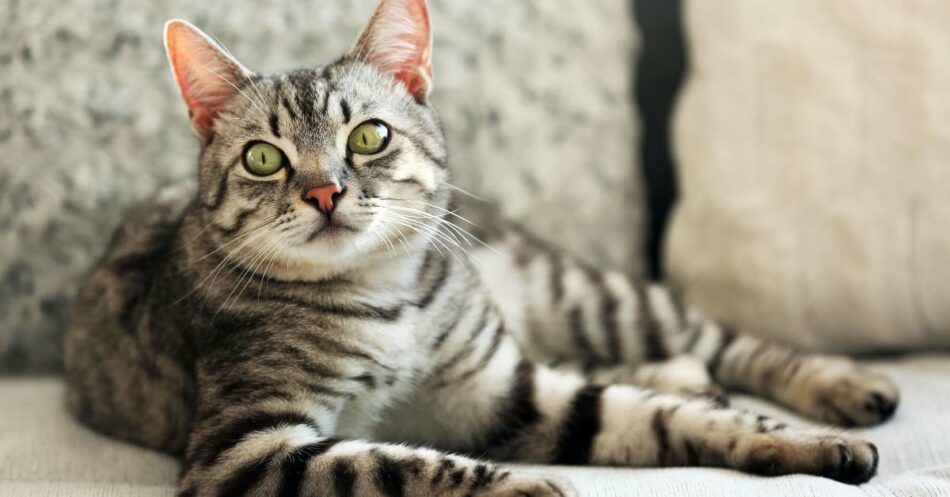
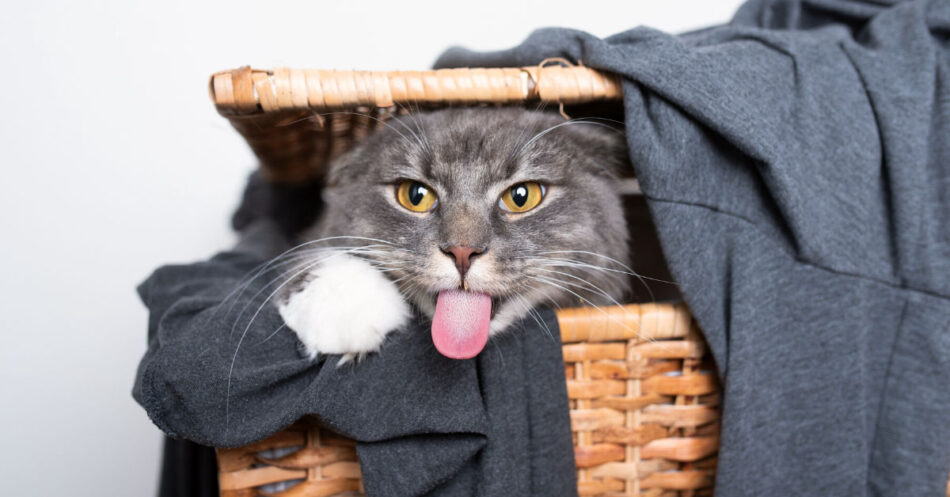
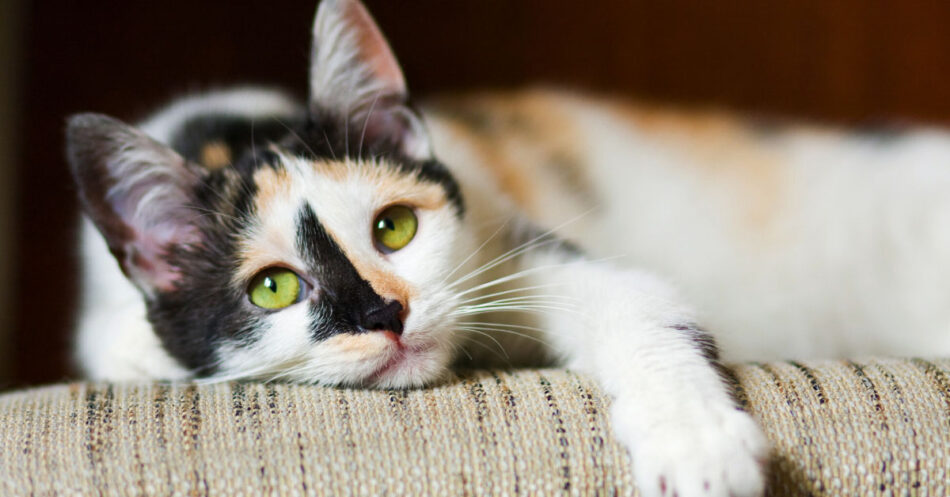
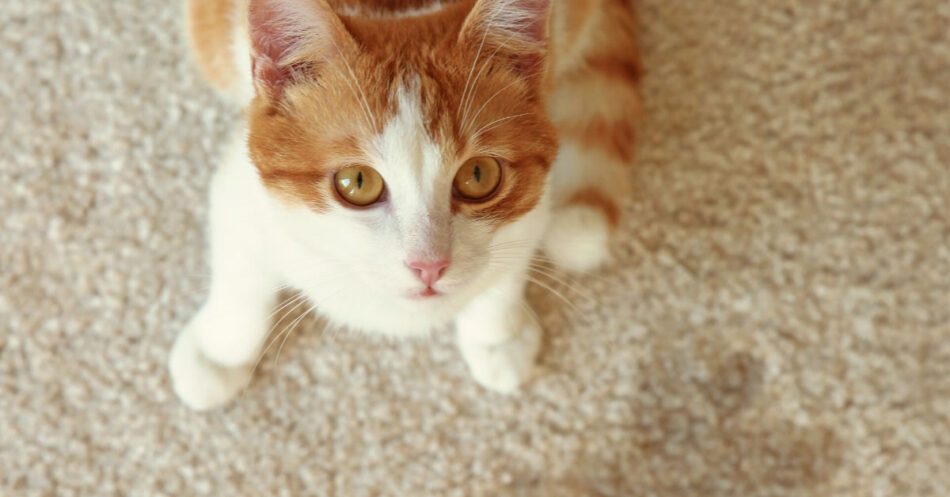
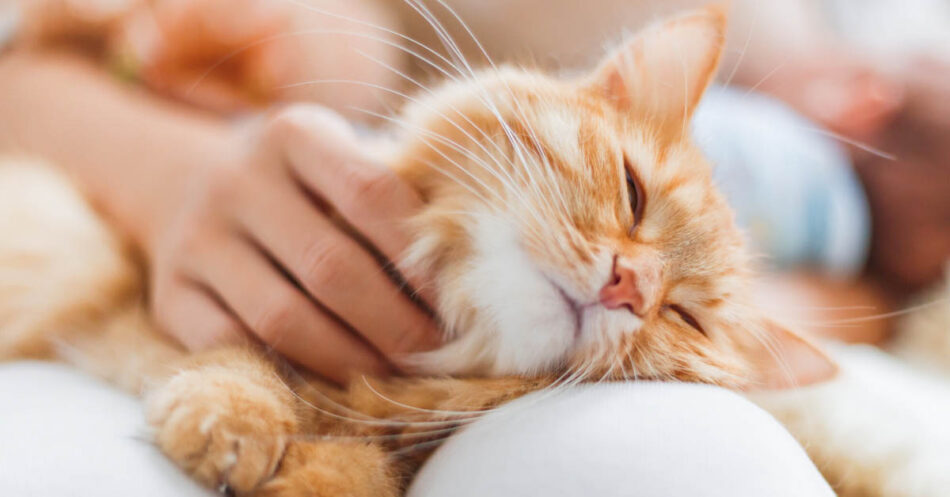
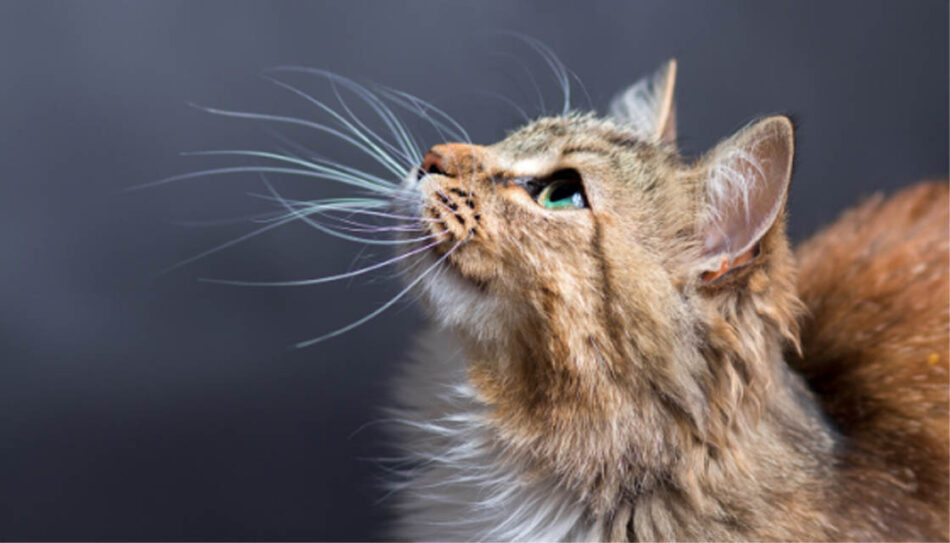
Great, thanks for sharing this blog article. Want more.
Thanks for reading! I am glad this helped!
Kristen
Similar issue here: Crying, meowing for no reason. Even cats need to sometimes be vocal to just hear their own voice, I get that. But, sometimes enuf is enuf! We have a 2 yr old kitty, Megan, adopted 5 months ago and has adjusted well. We are both retired so have plenty of time and attention. Established routines since day 01. She’s not our first cat. Kitty has fresh water at all times (changed twice daily), free feed dry kibble at all times. I hide small quantities of her food so she can hunt (part of her daily feed) and kibble is also placed inside toys and tossed for her to run and catch. Kitty doesn’t really care much for treats or catnip. We play numerous times daily. She sleeps with me. Toys get swapped out when she gets bored. She has alone toys and ‘play with me’ toys. Litter box is changed daily. She is 100% healthy and shots up to date. She has multiple safe places thru the house to den down and nap uninterrupted, including a perch to watch outside squirrels and birds Kitty also has a cat bed or can sit with us or wherever she wants in the living room, plenty of places for her to settle down. There are no closed doors in the house other than exits. No other animals in the house, no kids, so no agitation. She sleeps very well. She can eat a good meal, go potty, groom, take a nap, then 15 mts of playtime (usually until she decides she is done and quit playing so she know she is exercised). We may settle down to watch TV. At that time, kitty will meander into another room, then start loudly fussing. She will almost deliberately go into another room to start whining. Do we call her to come here? Yes. Does she? No. She just cries and meows. If you get up and start doing something (put away laundry, dishes, sweep, clean, tidy up) she happily comes along to keep you company and only occasionally wants to chat with you (I also encourage her to come along and talk to her coz I feel this is good bonding and exercise and stimulation). But once we settle down into our chairs, it is ON and time for her to scream non-stop (hours if you can bear to listen to that for hours). Seems Like on purpose she leaves the room to go into another room to just sit there and scream. The TV is not too loud so the volume is not hurting her ears, she will happily nap during a loud game of football, lol, so that isn’t it. You could be reading quietly and she does the same thing.
QUESTION: Is it wrong to wade thru the 10 or 15 toys scattered on the floor to walk over calmly, gently scoop up kitty, without saying a word, after 15 mts or so or her ‘singing the song of her people’ to put her in a bedroom and close the door? This would be the bedroom we share at night and there is a potty box and water for her. We would only put her in there for as long as she is wailing.
Sorry I know this is long but I want to clarify her toys are regular cats toys, plastic bottle caps, anything that catches her fancy and is safe and also toys that wiggle and scoot along (battery and USB powered) when we aren’t doing interactive toys with her (wands, tonka toy trucks she loves, tossing toys to her to chase, etc) so she has plenty of toys and gadgets. And Megan Kit has blankets in every room as well as her beds and tower perch condo.
Hi Carla,
It seems like she could be trying to get your attention. Some cats, especially if you are home all of the time, just get lonely. It does sound like you are spending a lot of time with her, though. Does she always get vocal in the same area? She could be “hunting” something on the ceiling or outside. She may just see some dust or a cobweb she wants to get her paws on!
I wouldn’t suggest locking her in the room until she is quiet, as I don’t think that would solve the problem. Try hiding some of her hunting toys in the room where she gets vocal. Then, she can satisfy that hunting instinct. You can also put a Feliway diffuser in that room, as that releases calming messages into the area that only they can smell. You can get one here:.
Let me know how it goes! It’s also worth checking with your vet to make sure she is totally healthy!
Kristen
Thanks again for the blog post.Really looking forward to read more. Cool.
I have a cat that was abanded she was outside the most of her life and we got her fixed 2 days ago and she won’t stop meowing i need to know if she is in pain or bored or just want to play she is about 6 months old so i am scared i need to know if she is in pain or no and also she will not let you go to bed and when you put her on the bed she jump right of and play with her toys i really need your help i only got one hour of sleep.Oh yeah she has another cat with her but they are scared of each other can you please tell me why they are both girls/females
thank you
Liliana
Hi Liliana,
Kittens by nature are more playful than adult cats. So, if she is meowing, she may just be playing or wanting to play with you. I would call your vet where she was spayed to get her checked out if you are concerned she is in pain from her procedure. Kittens typically bounce back quickly after a spay/neuter, so it’s likely that she is wanting to play, but definitely a good idea to check in with your vet.
Cats are nocturnal, and unfortunately they won’t typically want to sleep at bedtime when they are kittens. So, it’s important to feed her at the same time each day, and have a set playtime with her that way she can get used to having a routine. Then, she may start going to sleep at bedtime the older she gets!
Cats can take a while to get used to one another since they are territorial in nature. So, be sure to cautiously and slowly introduce her to the other cat you have in your house. It’s best to keep them in separate rooms for a week or so until they get used to the other’s scent. It can take months for them to warm up to one another. This book is an excellent resource for introducing cats.
I hope this helps! Thanks for rescuing a new cat!
Kristen
I believe that is among the such a lot important information for me. And i’m glad reading your article. But want to remark on some common things, The web site taste is perfect, the articles is in point of fact great : D. Good process, cheers
Hello, I have 2 cats one of them (Kevin) we got 2 years ago and the other one (Kacy) we got like mid October of this year so not long ago. Kevin is completely fine and quiet with good qualities which I wish would rub off on Kacy cause she’s mischievous. Anywho so my post is about Kacy, at random times (but usually morning and night) she will meow nonstop. For the most part I’d say that she does this when she is on the window sill looking outside but she also does it randomly when she’s just walking around too. After reading your post I realize we have been treating the issue the wrong way by spraying and yelling at her. But even then she doesn’t stop. Please help cause we really like her but she can get annoying when we are doing our homework and when we are trying to sleep. Also she cries a lot when we open the front door. She was previously a stray cat so I’m not sure if maybe she just wants to run around and be free again.
Hi Amanda!
How old is Kacy? Kittens sometimes will meow a little more when they are younger to learn how to get your attention. Meowing in the morning and at night can indicate that she is hungry. Is this when you usually feed her? Ensuring she has a set feeding time is important since cats are so routine oriented.
Additionally, it sounds like she might be meowing at her “prey”. Since she typically meows at the window/door, she likely sees a bird or a squirrel that she is “hunting”. This is very common for indoor house cats. This meow is likely out of excitement for seeing her prey, not that she wants to go back outside. Keeping cats indoors is really important as they are exposed to many diseases when they are outdoors, and un-spayed female cats can become pregnant very young. I would highly recommend keeping her indoors at all times and ensuring she gets spayed if she isn’t already.
Cats meow to communicate with us, so it is likely she is telling you something. She could be hungry, need some attention, or be hunting her prey. I would put Feliway diffusers around your house, as those communicate natural calming messages to felines. This can help her feel more comfortable in her new home. You can also get automatic feeders to help establish a set mealtime for both of your cats. This could help her be less likely to meow in the morning and night.
I hope this helps! If you are concerned about her meowing, I would definitely recommend a vet appointment to ensure she is not in any distress!
Keep me posted.
Kristen
yea this is awsome
Glad you liked it, Sophia!
Kristen
I have 2 kittens who I just brought home.bThey have been fixed and had a health check as well as being microchipped. They have a new environment to get use to however they meow/scream mom stop,getting in louder here and there.what am I doing wrong
I have a pretty similar problem my cat has been meowing all morning and I’m not totally sure why so, I tried to pick him up but, then, he bit me, I guess he didn’t eat to be picked up?
I have a pretty similar problem my cat has been meowing all the time and I’m not totally sure why so, I tried to pick him up but, then, he bit me, I guess he didn’t eat to be picked up?
Rachael,
If a pet who’s normally okay with you handling them bites you, it could mean they’re in pain. Given that they’re also meowing constantly, I’d suggest talking to your vet to see if there’s a medical issue.
I hope everything’s all right with your kitty!
Kristen
Thanks for the informative video. I have a new tabby cat who meows constantly, and especially at night. He was a stray and I’m pretty sure he has anxiety. :/